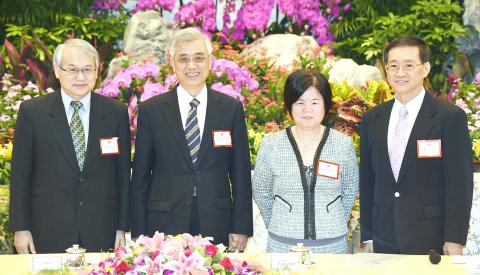President Ma Ying-jeou’s (馬英九) latest nominations for grand justices drew criticism yesterday, as Democratic Progressive Party (DPP) legislators and civic groups questioned not only his right to nominate candidates, but also whether a judge who acquitted him in a corruption case is an appropriate nominee.
“The tenures of grand justices and the president have been designed in such a way so as to avoid having one president recommend candidates for the Council of Grand Justices twice” during his or her term in office, Taiwan Jury Association chairman Cheng Wen-lung (鄭文龍) told a news conference in the legislature yesterday morning.
“After making all these nominations, the Council of Grand Justices would be Ma’s Council of Grand Justices, and we would have an authoritarian constitutional system,” Cheng said.

Photo: Wang Min-wei, Taipei Times
Based on the current system, seven of the 15 grand justices are to serve four years, while the other four would serve eight years to avoid having one president nominate all sitting grand justices, Cheng said.
The candidates have to be confirmed by the legislature.
“Due to the Chinese Nationalist Party’s (KMT) boycott of the four nominees made by the previous president, Ma was able to nominate 11 grand justices in 2008,” Cheng said. “If he nominates four more, all 15 of them would be Ma’s nominees.”
DPP Legislator Tien Chiu-chin (田秋堇) agreed, urging Ma to withdraw his nominations to allow the next president, who is to be elected next year, to do so.
“Otherwise, it would create chaos in society,” she said.
Citizens’ Congress Watch executive director Chang Hung-lin (張宏林) urged legislators to reject the four nominees: lawyer Huang Horng-shya (黃虹霞), Deputy Minister of Justice Wu Chen-huan (吳陳鐶), National Taiwan University law professor Tsai Ming-cheng (蔡明誠) and Shilin District Court President Lin Jyun-yi (林俊益).
Aside from the constitutional issue, DPP Legislator Huang Wei-cher (黃偉哲) questioned Ma’s choice of Lin, a former Supreme Court judge who acquitted Ma of corruption charges in connection with the use of his special allowance during his stint as Taipei mayor.
“It is obvious that Ma is trying to pay Lin back by nominating him as a grand justice,” Huang said.
In response to the criticism, Ma said that it is his constitutional obligation to nominate grand justices when the seats become vacant.
“The president or the legislature would be acting unconstitutionally if we fail to fulfill our constitutional duties,” he said.
Presidential Office spokesperson Charles Chen (陳以信) said the candidates have been recommended by a special review commission, and the president was merely making nominations accordingly.

A magnitude 7.0 earthquake struck off Yilan at 11:05pm yesterday, the Central Weather Administration (CWA) said. The epicenter was located at sea, about 32.3km east of Yilan County Hall, at a depth of 72.8km, CWA data showed There were no immediate reports of damage. The intensity of the quake, which gauges the actual effect of a seismic event, measured 4 in Yilan County area on Taiwan’s seven-tier intensity scale, the data showed. It measured 4 in other parts of eastern, northern and central Taiwan as well as Tainan, and 3 in Kaohsiung and Pingtung County, and 2 in Lienchiang and Penghu counties and 1

FOREIGN INTERFERENCE: Beijing would likely intensify public opinion warfare in next year’s local elections to prevent Lai from getting re-elected, the ‘Yomiuri Shimbun’ said Internal documents from a Chinese artificial intelligence (AI) company indicated that China has been using the technology to intervene in foreign elections, including propaganda targeting Taiwan’s local elections next year and presidential elections in 2028, a Japanese newspaper reported yesterday. The Institute of National Security of Vanderbilt University obtained nearly 400 pages of documents from GoLaxy, a company with ties to the Chinese government, and found evidence that it had apparently deployed sophisticated, AI-driven propaganda campaigns in Hong Kong and Taiwan to shape public opinion, the Yomiuri Shimbun reported. GoLaxy provides insights, situation analysis and public opinion-shaping technology by conducting network surveillance

‘POLITICAL GAME’: DPP lawmakers said the motion would not meet the legislative threshold needed, and accused the KMT and the TPP of trivializing the Constitution The Legislative Yuan yesterday approved a motion to initiate impeachment proceedings against President William Lai (賴清德), saying he had undermined Taiwan’s constitutional order and democracy. The motion was approved 61-50 by lawmakers from the main opposition Chinese Nationalist Party (KMT) and the smaller Taiwan People’s Party (TPP), who together hold a legislative majority. Under the motion, a roll call vote for impeachment would be held on May 19 next year, after various hearings are held and Lai is given the chance to defend himself. The move came after Lai on Monday last week did not promulgate an amendment passed by the legislature that

AFTERMATH: The Taipei City Government said it received 39 minor incident reports including gas leaks, water leaks and outages, and a damaged traffic signal A magnitude 7.0 earthquake struck off Taiwan’s northeastern coast late on Saturday, producing only two major aftershocks as of yesterday noon, the Central Weather Administration (CWA) said. The limited aftershocks contrast with last year’s major earthquake in Hualien County, as Saturday’s earthquake occurred at a greater depth in a subduction zone. Saturday’s earthquake struck at 11:05pm, with its hypocenter about 32.3km east of Yilan County Hall, at a depth of 72.8km. Shaking was felt in 17 administrative regions north of Tainan and in eastern Taiwan, reaching intensity level 4 on Taiwan’s seven-tier seismic scale, the CWA said. In Hualien, the